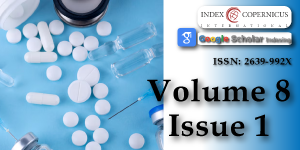Modulation of Microbiota and its Impact on Depression
Main Article Content
Abstract
Gut microbial flora is the largest micro-ecosystem in the human body, it is symbiotically associated with the host; and maintains normal physiological processes in a dynamic equilibrium state. A plethora of evidence supports that gut microbial flora influences the neurotransmitters of the central nervous system. This gut flora influences cognitive function, anxiety, depression; and mood disorders as they are capable of synthesizing neurotransmitters in the nervous system. Therefore intake of probiotics influences gut microbiome; and depression. The versatility and number of gut microbial flora varies individually, so the content of common gut microbes may affect the neurotransmitters, manipulating the gut microbiota with probiotics offers a novel approach to treat brain disorders such as depression via GUT-BRAIN AXIS. The present review outlines the aspect of such alterations and how modulation of gut microbiota influences depression.
Article Details
Copyright (c) 2024 Maparu K.

This work is licensed under a Creative Commons Attribution 4.0 International License.
Chen Y, Zhou J, Wang L. Role and Mechanism of Gut Microbiota in Human Disease. Front Cell Infect Microbiol. 2021;11:625913. Available from: https://doi.org/10.3389/fcimb.2021.625913
Ling Z, Xiao H, Chen W. Gut Microbiome: The Cornerstone of Life and Health. Adv Gut Microbiome Res. 2022;2022(1):9894812. Available from: https://doi.org/10.1155/2022/9894812
Appleton J. The Gut-Brain Axis: Influence of Microbiota on Mood and Mental Health. Integr Med (Encinitas). 2018;17(4):28-32. Available from: https://pubmed.ncbi.nlm.nih.gov/31043907/
Hemarajata P, Versalovic J. Effects of probiotics on gut microbiota: mechanisms of intestinal immunomodulation and neuromodulation. Ther Adv Gastroenterol. 2013;6(1):39-51. Available from: https://doi.org/10.1177/1756283x12459294
Chaudhry TS, Senapati SG, Gadam S, Mannam HPSS, Voruganti HV, Abbasi Z, et al. The Impact of Microbiota on the Gut-Brain Axis: Examining the Complex Interplay and Implications. J Clin Med. 2023;12(16):5231. Available from: https://doi.org/10.3390/jcm12165231
Dicks LMT. Gut Bacteria and Neurotransmitters. Microorganisms. 2022;10(9):1838. Available from: https://doi.org/10.3390/microorganisms10091838
Conlon MA, Bird AR. The impact of diet and lifestyle on gut microbiota and human health. Nutrients. 2014;7(1):17-44. Available from: https://doi.org/10.3390/nu7010017
Jach ME, Serefko A, Szopa A, Sajnaga E, Golczyk H, Santos LS, et al. The Role of Probiotics and Their Metabolites in the Treatment of Depression. Molecules. 2023;28(7):3213. Available from: https://doi.org/10.3390/molecules28073213
Dinan TG, Cryan JF. The Microbiome-Gut-Brain Axis in Health and Disease. Gastroenterol Clin North Am. 2017;46(1):77-89. Available from: https://doi.org/10.1016/j.gtc.2016.09.007
Creed F. How do SSRIs help patients with irritable bowel syndrome? Gut. 2006;55(8):1065-7. Available from: https://doi.org/10.1136/gut.2005.086348
Clarke G, Grenham S, Scully P, Fitzgerald P, Moloney RD, Shanahan F, et al. The microbiome-gut-brain axis during early life regulates the hippocampal serotonergic system in a sex-dependent manner. Mol Psychiatry. 2013;18(6):666-73. Available from: https://doi.org/10.1038/mp.2012.77
Gianfrancesco MA, Barcellos LF. Obesity and Multiple Sclerosis Susceptibility: A Review. J Neurol Neuromedicine. 2016;1(7):1-5. Available from: https://doi.org/10.29245/2572.942x/2016/7.1064





